While most of us were busy whipping up dalgona coffee and baking banana bread during Covid-19 lockdowns, Ayushma Rana was out distributing food packets to those in need. Despite her family’s repeated pleas to stay home as she had two small children and aging parents, Rana could often be found scurrying from one place to another in Bhaisepati, Lalitpur, trying to reach as many daily wage workers as possible.
“I told my family I would help 100 people and then I would stay at home. When that goal was met, I said 50 more, and I’d stop. But before I knew it, I’d managed to reach 6,000 people,” says Rana, founder of ST Group which deals in luxury gift packaging and event management.
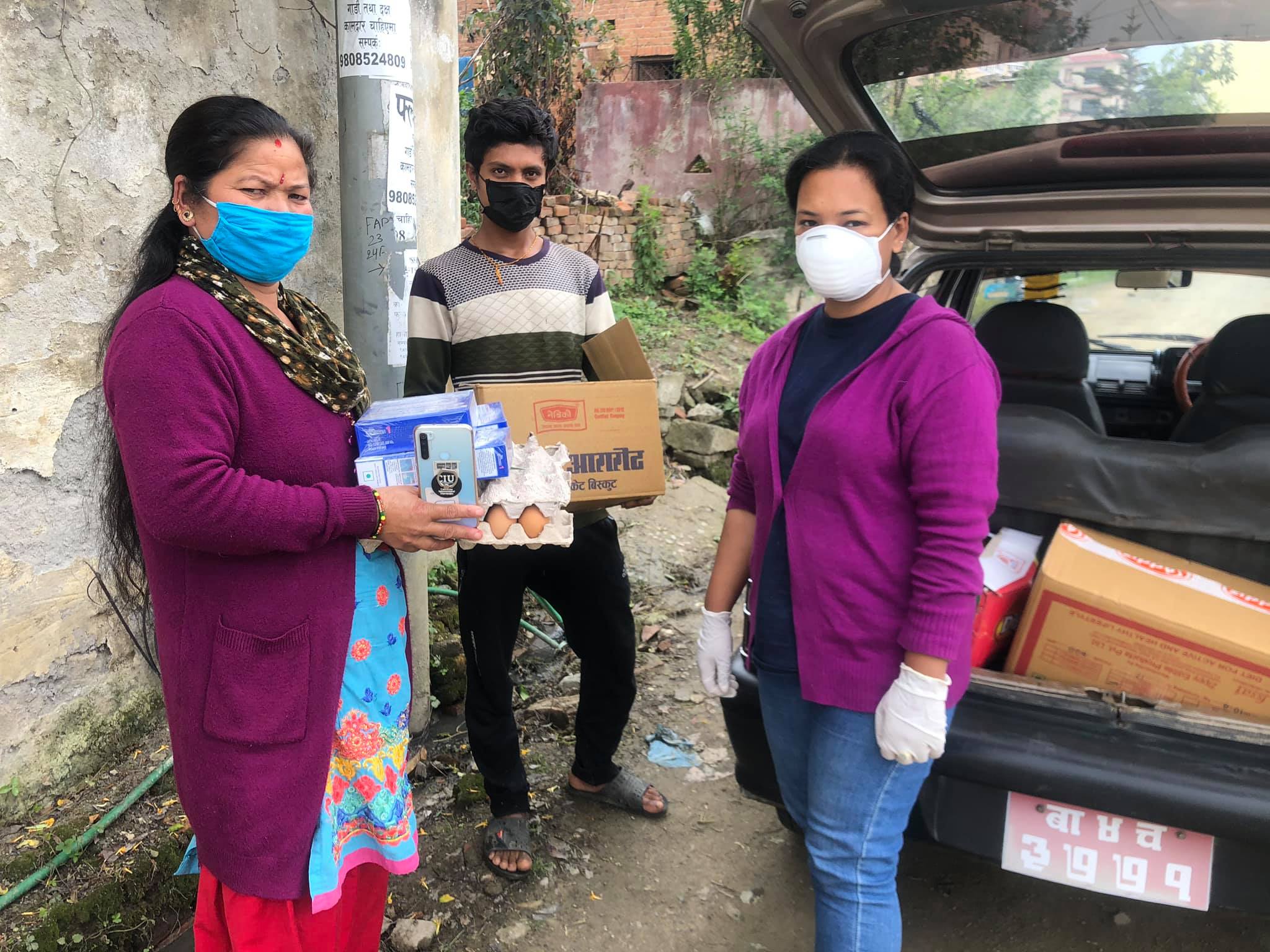 Ayushma Rana distributing food packages during Covid 19 lockdown.
Ayushma Rana distributing food packages during Covid 19 lockdown.
This, however, wasn’t anything new for her. Rana has always tried to do whatever little she could whenever she could. During the 2015 earthquakes, her home in Ekantakuna, Lalitpur, got destroyed but she and her brother were out helping victims with food, medicines, and other necessities. Since 2016, she has also been distributing socks and woolen caps to street children, vendors, milkmen, and garbage collectors every winter.
“I believe each one of us must do what we can whenever we can. Every little bit counts especially in a country like Nepal where the government is apathetic and so many people struggle to make ends meet on a daily basis,” she says.
Her views are echoed by Saurav Rimal, who is involved in various smart city projects. Rimal says we have, for far too long, been complacent and thus dependent on the local authorities and the government. We are quick to complain but hesitate to take action, he adds.
When Kathmandu was under a lockdown, Rimal visited places in the city like Gongabu bus park, Bhrikutimandap, and Kirtipur that used to be crowded pre-Covid. His goal was to find daily wage earners who were struggling to put food on the table.
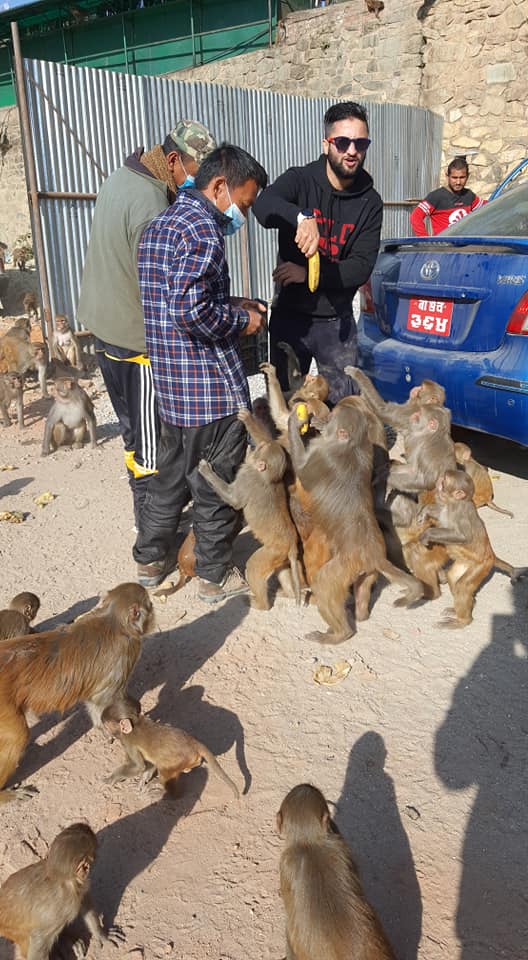
Saurav Rimal feeding monkeys during the Covid-19 lockdown.
Rimal’s efforts kept more than 500 families from starving during the lockdown. He also fed monkeys and stray dogs in and around the Pashupati and Swayambhunath areas.
Recently, Rimal distributed jackets and blankets to sugarcane farmers from Sarlahi who were in Kathmandu for a protest. They were asking the government to see to it that the sugar mills cleared their dues.
Many of them, he says, didn’t have a proper place to stay and had flimsy clothes ill-suited for Kathmandu’s steadily dipping temperature. Rimal used his own savings and money sent by friends abroad to buy them some warm clothes as well as make arrangements for a decent place to stay.
“I know what I’m doing isn’t sustainable. There is only so much I will be able to do with my limited resources. But I still intend to do everything I can for as long as I can,” says Rimal.
This is where unity as Nepalis would come in handy, he adds. If communities came together to help those in need instead of merely cribbing about how the government doesn’t do anything, we could witness a sweeping change across the nation.
“Unfortunately, most people have the mindset that as long as they are paying their taxes, they needn’t be bothered with anything else,” he says.
No help is small
Juju Kaji Maharjan, who comes from a family of social workers, feels this is because most people underestimate the power of a single person working for a cause. They don’t think feeding a homeless person or helping a family with their hospital bills can make much of a difference.
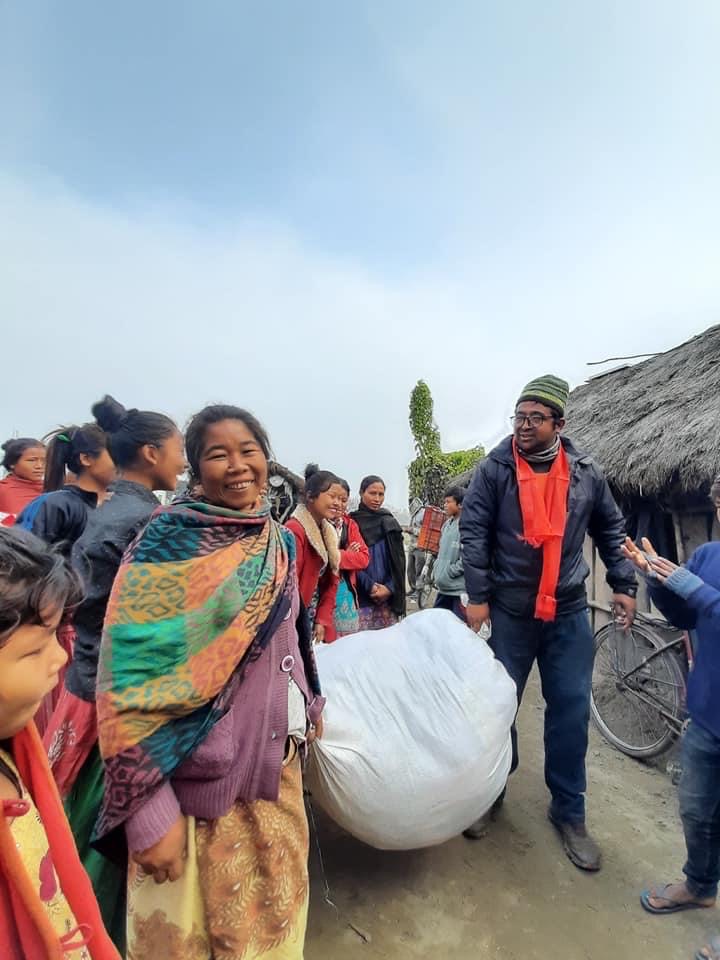
What most don’t understand, he says, is that small actions can have a ripple effect and ultimately lead to big changes. The results of those small actions aren’t immediately visible that a lot of people find it difficult to stay motivated.
Rana says helping others gives her a sense of peace and more people should do it because it feels so good. “It’s an endorphins rush that you’ve got to experience,” she says. When she hands someone a pair of socks, she is consoled by the fact that the receiver might stay a little warm, at least for that night. Every selfless action has the potential to make life a little better for someone else and for you too, she adds.
According to Dristi Thapa, who works at The Orphan’s Home in Nakku, Lalitpur, no help is big or small. What matters is you choose to operate out of a place of love and that will never go unappreciated.
Thapa started working at the orphanage as she has always believed in the importance of giving back and making a difference, as small as that might be. The children at the home, she says, take delight in the tiniest of things. For example, they were ecstatic about a slice of cake they all got on her birthday. Their eyes just lit up, she says. You would have to consider yourself lucky to be a harbinger of that kind of pure happiness.
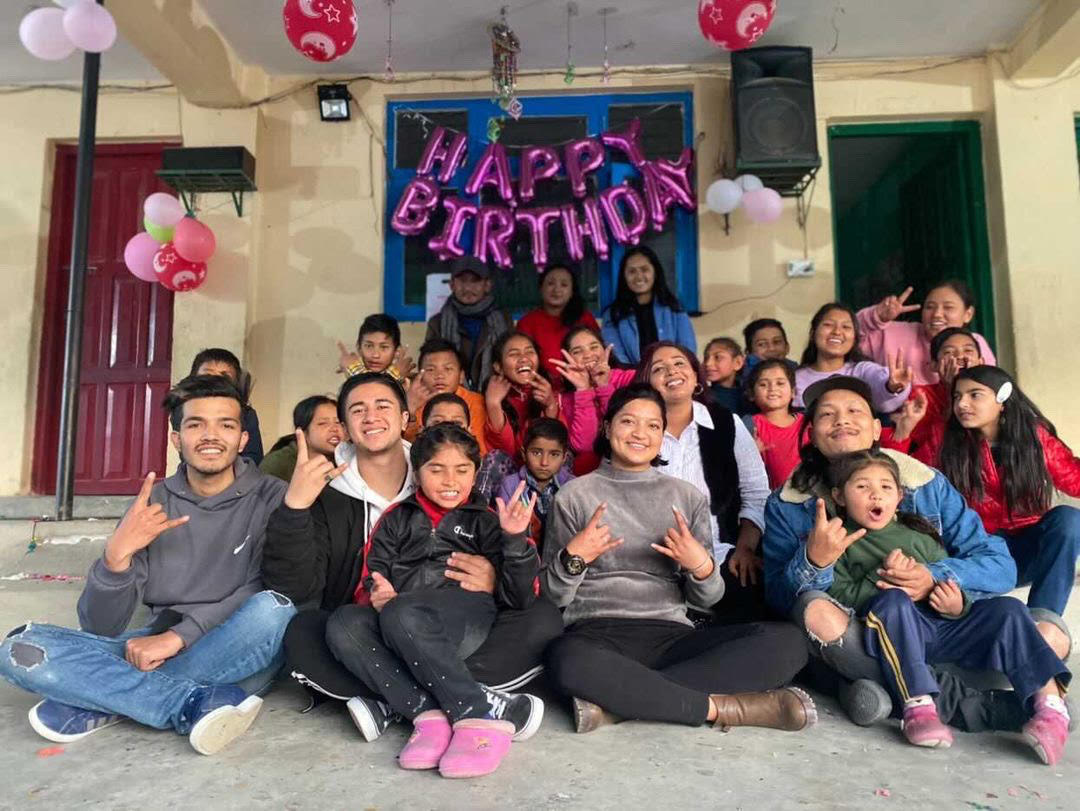 Dristi Thapa celebrating her birthday with orphans.
Dristi Thapa celebrating her birthday with orphans.
“I might not be able to do very much but if I can bring even the littlest of joys in a child’s life then it will be a life well lived,” she says.
Joy in feeding
Jimi Prem Karthak, proprietor of The Lunch Box, a fast-food restaurant in Kupondole, Lalitpur, runs Food for Naanis program. It was initiated with a simple idea of providing good food for children who need it. The program runs in the city and, though they get a lot of flak for it, Karthak says there is a reason they aren’t keen on focusing on rural areas just yet.
“People in villages grow their own food and most families eat nutritious meals. On the other hand, many low-income families in Kathmandu don’t care about nutrition. It’s also, I think, a case of bad parenting,” he says.
However, Food for Naanis isn’t a charity program and he isn’t a social worker. He doesn’t want to be a messiah for those his program helps. Run entirely on donations by friends and family, and with contacts he has made over the years, he says he is running a party (much like a political one) where there is good governance.
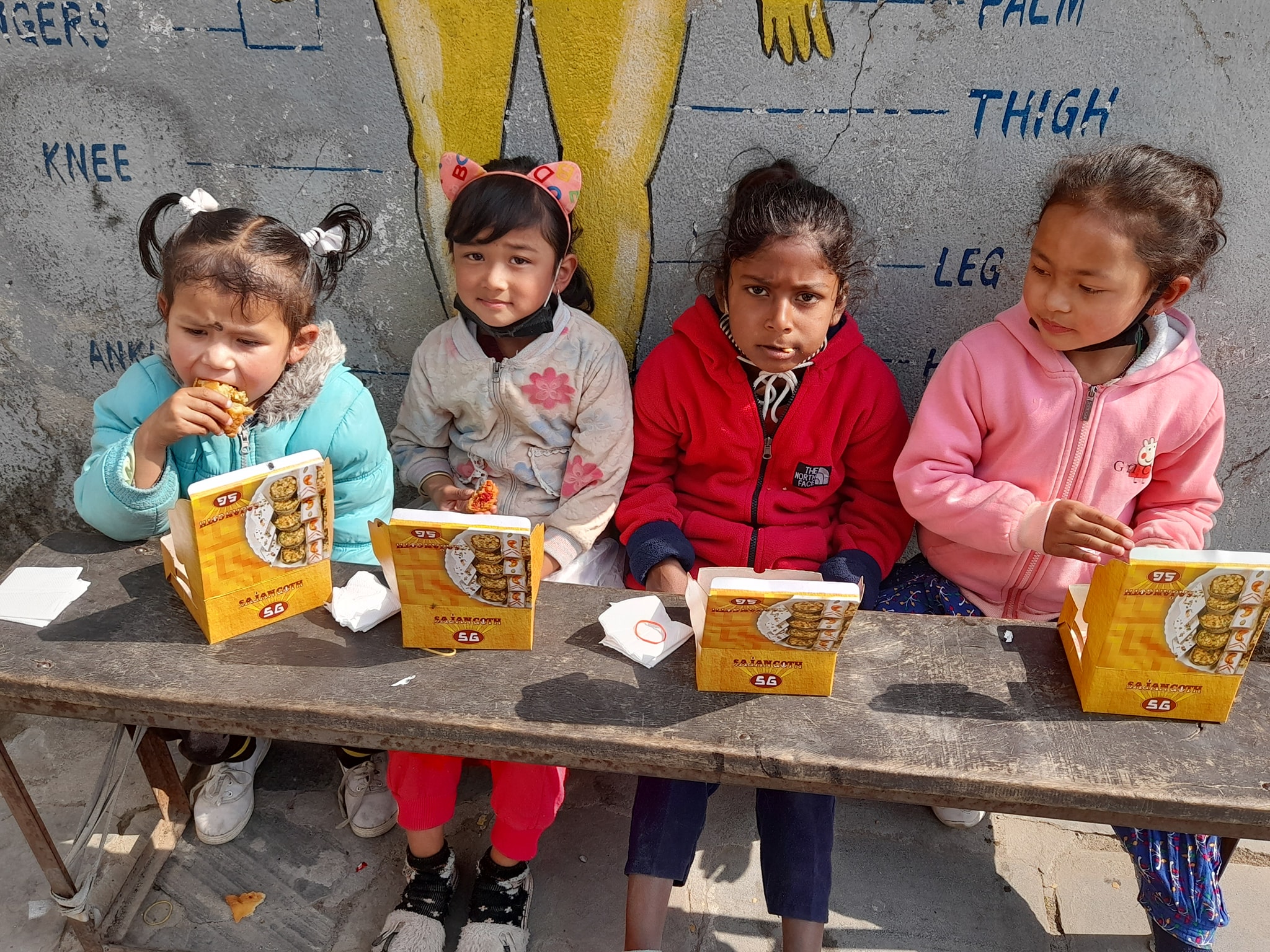 Children eating from food boxes under the Food for Naanis program headed by Jimi Prem Karthak.
Children eating from food boxes under the Food for Naanis program headed by Jimi Prem Karthak.
“This approach works because there are many people who want to help but don’t have the time to do so on their own. Nor do they know who to trust with their money. If they see there are people who are doing things in an organized way, it’s a win-win situation for all of us,” he says.
So, in that way, Food for Naanis is actually a medium to connect those who want to help with those who seek it. The program has a record of feeding 2,300 children in around two dozen orphanages in a single day.
However, transparency and accountability are often serious issues when you start taking donations, even if they come from friends and relatives. Rana made multiple appeals through social media as she sought help to provide nutritious food to pregnant women, lactating mothers and newborn babies.
To assure those who sent her money through various online payment portals, she took to posting photos of the supplies as well as the deliveries. She also posted photos of hospital bills when she used the funds to treat Covid-19 patients who were unable to afford healthcare.
Do it anyway
Karthak says transparency is sometimes a struggle because orphanages and schools’ authorities don’t always want him to take photos. It’s often a hassle to explain that he just wants to show donors that their money has reached the intended beneficiary.
It’s this complexity in an otherwise noble undertaking that makes Rimal steer clear of donations, though his circle of friends has helped him time and again. He would rather people give what they can to those in need themselves. You could, he says, start by giving a homeless person a packet of biscuits. It could be as basic as that.
“What’s important is that we change our mindset that a little won’t go a long way,” he says, urging you to imagine what, say, 500 rupees set aside from your salary every month could eventually amount to and how that could help someone who doesn’t have the same privileges in life as you.
“And think what could happen if every person in your community started doing this,” he says.
Maharjan agrees that, if you aren’t happy with how things are, you have to start doing what you can instead of always placing the responsibility on someone else’s shoulders.
“The thing about taking up social causes is that besides being an immensely gratifying experience, it’s addictive as well. Once you start and get the feel of it, you cannot stop,” he concludes.











